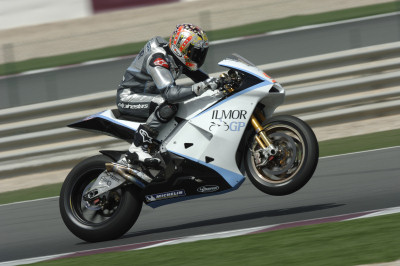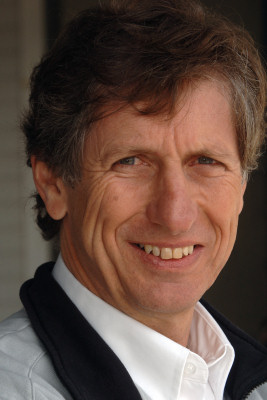The Way It Is/ Mario Illien on the right formula for the future
by Gordon Kirby Mario Illien is one of the world's great racing engine designers and co-founder with his late partner Paul Morgan and Roger Penske of Ilmor Engineering. Based in Brixworth, Northamptonshire in south central England, Ilmor built the dominant Chevrolet Indy car engines of the late eighties and early nineties before making an alliance with Mercedes-Benz to design and build Formula 1 and Indy car engines.
Mario Illien is one of the world's great racing engine designers and co-founder with his late partner Paul Morgan and Roger Penske of Ilmor Engineering. Based in Brixworth, Northamptonshire in south central England, Ilmor built the dominant Chevrolet Indy car engines of the late eighties and early nineties before making an alliance with Mercedes-Benz to design and build Formula 1 and Indy car engines.
Among his many successful engines Illien may be best known for the 209 cubic inch, single cam turbo V-8 Mercedes-Benz engine with which Al Unser Jr and Emerson Fittipaldi blew away the field in the 1994 Indianapolis 500. At the time, single camshaft, rocker arm engines were allowed substantially more boost than the traditional, four-cam turbos and Illien and Morgan sold Penske and Mercedes-Benz on the secret project which was hatched on an unsuspecting world at Indianapolis that month of May thirteen years ago.
Unser and Fittipaldi lapped everyone in the race and Unser won easily after Fittipaldi crashed, but all the other teams wailed and complained so much that the single cam option was removed from the rulebook the following year with the exception of the crudely similar, stock block-based Buick engine. Back with a normal Ilmor four-cam engine in 1995, like almost everyone else, the Penske team famously failed to qualify for the 500.
Today, after splitting with Mercedes two years ago, Ilmor continues to do development work on their 800 cc Moto GP engine and works with Honda on both its IRL and Formula Nippon engine programs. Ilmor also does engine development work for Penske's NASCAR team. "And we do a few other development programs for various people," Illien added secretively.
Illien has thought for many years about green fuel technology and has some very clear ideas about where he believes Formula 1 should go with the FIA's planned move to a new formula for 2011. He has no doubts that the existing piston engine will continue for many years as the prime source of power for both racing and road cars and is extremely skeptical of how hydrogen fuel cells might be adapted to racing.

© courtesy Ilmor
Like many of us, Illien believes that a healthy aural experience is essential to motor racing's spectacle and public appeal. "At the end of the day motor racing primarily is show business and that part of it has to be good or the interest and the following won't be there," he commented. "To me, if you had a bunch of whispering cars going around, there would be no great excitement. I can't see it being much of a show. You need to have the sound of the engines in racing."
Illien has long been a proponent of hybrid engine technologies and even designed and built a hybrid for racing which was banned before it was ready to race. "I've been lobbying for hybrids for many years," he remarked. "Back in 2000 we had a system almost on the track but then it was forbidden."
The FIA is talking about going to fuel restricted, rev-limited 2.2 liter turbocharged V-6s for F1 in 2011 with the freedom to use energy recovery systems on the engine and car. Illien is enthusiastic about the FIA's plans for a new 'green' Formula 1 and hopes it will produce some interesting hybrid solutions.
"The additional performance of the race car will come from fuel efficiency of the engine and from the energy recovery systems on board," Illien observed. "This will and can open a catalogue of systems and technologies to improve the overall performance of a car with a fixed amount of fuel. An engine converts approximately one-third of the total energy of the fuel into mechanical energy, one-third into cooling energy and one-third into the energy in the exhaust gas. Currently, we are using the mechanical part only and therefore there is a big potential to extract additional energy from the exhaust and the heat of the engine to turn into propulsion."
Illien is a firm believer in the transfer of technology between racing and road cars. "With a race car the aim is to cover a given distance with a given amount of fuel as fast as possible," he remarked. "On the other side with a road car the aim is to cover the biggest possible distance with a given amount of fuel. In both cases, efficiency and and utilization of the available energy is required in the best way with a different accent. The principal of the systems in a race car should have similarities to what is practical in road cars."
Illien believes a useful amount of electrical power can be converted from the heat produced by the engine. "I would think electrical systems should be adopted and developed to make sure the road car industry can benefit from the racing activities," he said. "I can't see any benefits to develop flywheel systems to store braking energy on a race car if we are not going to adopt such systems on road cars. The electrical solutions are going to be simpler and easier to control and adapted for its needs as demonstrated by several manufacturers in their development work."

© courtesy Ilmor
Illien sees some interesting technical challenges for the teams in best harnessing regenerative braking power. "To recover this braking energy effectively in a race car the system would have to tap into the front wheels as they do the majority of the braking," he mused. "The braking of the rear wheels is limited and offset with engine power to balance and stabilize the car during braking. To make best use of your hardware, would you now feed the recovered energy back through the front wheels or as a combination of front and rear wheels?
"Racing car rules with this kind of flavor would be very interesting for engineers and manufacturers," Illien added, "and could speed up the development and effectiveness of any such system for road car use as well as make more use of the fuel and reduce the strain on our environment."
Illien believes that a limited blend of fifteen to twenty percent ethanol is the best racing fuel for the future for both practical reasons and the best overall ecological benefits. "The use of an amount of ethanol mixed with petrol would be sensible," he said. "Such a ratio could be realistic and supported for road cars on a big scale combined with the energy recovery systems."
He's equally convinced that the focus for motor sport should be on improving fuel mileage and efficency and achieving additional performance and spectacle with all the added systems he's discussed. "This could be a fantastic challenge for both the racing and the car industries," he remarked.
Illien is not a fan of F1's current, homologated 2.4 liter V-8s which most people in F1 have acknowledged are essentially spec engines, all of them producing about the same power. "I personally like rules that are challenging and interesting from an engineering point of view," Illien said. "I regard what we have today as a bit boring. There's not much excitement technically. You still have the differences in cars but all the engines are more or less the same because they are over-regulated. The performance difference is really in the cars, not in the engines and there are no synergies with road car technologies."
Of course, as Illien is well aware, everyone argues that costs go up if the rules are opened-up. "Everybody talks about costs but I guarantee you some people will spend as much or more money than they have done before," he chuckled. "The biggest costs in racing are always from rule changes, whether useful or not. This time there is a great opportunity to make the most of a rule change to benefit longterm and in a big way. If the money spent on new technologies can be used and transferred to production cars, then there is a return for that investment and we can see some benefits from the racing activities on a bigger picture.
"The other thing that needs to be judged is, do the rulemakers want to have the manufacturers in the business? Currently, the manufacturers probably spend most of the money in Formula 1 and if you have no challenge and no technical interest, does that keep the manufacturers in the game? I think that has to be balanced."
Illien thinks pursuing hybrid technology will be good for racing and will attract new industries to racing as new systems have to be developed and manufactured. "There's an awful lot of electrical and electronic hardware required to recover energy and store it in this challenging environment," he remarked. "Everybody in racing wants an advantage over their opponents to be able to win. Therefore, you must move fast and you have to be creative and innovative to get that unfair advantage."
Illien adds that he and Ilmor would love to get back into F1 if the FIA's 2011 rules follow the efficiency and energy recovery route. "I'm thinking about hybrid systems and what Formula 1 could be in the future and how we could be involved. I hope with the changes they are talking about there would be an opportunity for us. It's definitely something I would be very interested in."
It might be a good thing if the FIA's fresh sheet of paper for 2011 attracts specialized companies like Ilmor and Cosworth back into F1 so that racing's top category was something other than a manufacturer-dominated world. Whatever happens, Illien's ideas deserve at least to be listened to. You have to hope his thinking will be given serious consideration by racing's powers-that-be, including F1, ALMS, IRL and any other series looking to embrace the technologies of the 21st century.
Auto Racing ~ Gordon Kirby
Copyright 2007 ~ All Rights Reserved
Copyright 2007 ~ All Rights Reserved
Top of Page